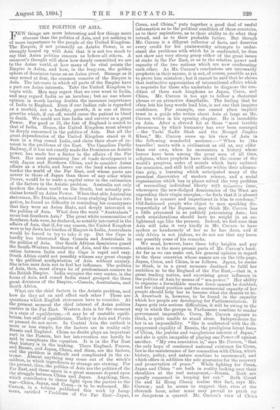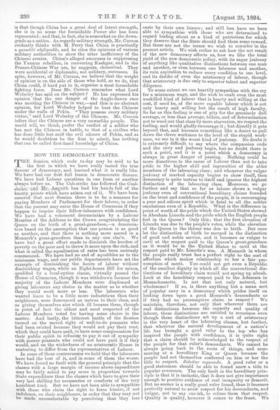THE POLITICS OF ASIA.
FEW things are more interesting and few things more obscure than the politics of Asia, and yet nothing is of more importance to the people of the United Kingdom. The Empire, if not primarily an Asiatic Power, is so strongly bound up with Asia that it is not too much to say that Asian politics concern us before all others. A moment's thought will show how deeply committed we are to the Asian world, at how many of its vital points the Empire is Asian, and how, in the long-run, the golden sphere of dominion turns on an Asian pivot. Strange as it may sound at first, the common concern of the Empire is Asia. The interests in which all parts of the Empire have a part are Asian interests. Take the United Kingdom to begin with. Men may regret that we ever went to India, and may regard India as an incubus ; but no one whose opinion is worth having doubts the immense importance of India to England. Even if our Indian rule is regarded es a morbid, not a healthy, growth, it is one of those growths which, if cut off, would cause the patient to bleed to death. We could not lose India and survive as a great Power. For good or ill, the fate of England is sealed to that of India. Hence, the United Kingdom must always be deeply concerned in the politics of Asia. But all the great dependencies of the United Kingdom stand as it were in a ring round India, and claim their share of in- terest in the problems of the East. The Canadian Pacific Railway, if it has not exactly made the Dominion an Asiatic power, has made her a factor in the affairs of the Far East. Her most promising line of trade development is with Japan and Northern China, and to consider Asian affairs as a whole, and leave out the land whose shores border the world of the Far East, and whose ports are nearer to those of Japan than those of any other white Power, would be to make a capital error in the estimation of the factors in the Asiatic problem. Australia not only borders the Asian world on the South, but actually pro- claims herself an Asian Power. When that able Australian statesman, Mr. Deakin, returned from studying Indian irri- gation, he found no difficulty in reminding his countrymen that they were an Asian State, and deeply interested in the politics of Asia. What does the word " Australasia" mean but Southern Asia P The great white communities of Southern Asia were, he declared, so notably interested in the affairs of Asia, that if, for any reason, the United Kingdom were to lay down her burden of Empire in India, Australasia would be forced to try to take it up. But the Cape is hardly less interested than Canada and Australasia in the politics of Asia. Our South African dominions guard the South-Western boundaries of Asia, and the communi- cation between India and the Cape is rapid and easy. South Africa could not possibly witness any great change in the political configuration of Asia without anxiety. She is too near Asia not to feel her influence. The politics of Asia, then, must always he of predominant concern to the British Empire. India occupies the very centre, is the focus of Asia, and round India stand grouped the three great divisions of the Empire,—Canada, Australasia, and South Africa.
What are the chief factors in the Asiatic problem, and how do they act on and affect each other These are questions which English statesmen have to consider. At the present moment the chief interest of Asian politics centres in the Far East. Western Asia is for the moment in a state of equilibrium,—it may be of unstable equili- brium, but still of equilibrium. Turkey in Asia and Persia at present do not move. In Central Asia the outlook is more or less simple, for the factors are in reality only Russia and England. China no doubt plays an important part in the Pamirs, but her intervention can hardly be said to complicate the equation. It is in the Far East that history is in the making. There England, France, and Russia, and Japan, China, and Siam, are the factors, and the problem is difficult and complicated in the ex- treme. Almost an thling may come out of the witch's caldron, in which hi ietiits so strange are stewing. For the present, then, the ics of Asia are the politics of the Far East, and these again in a great measure depend upon the struggle between China and Japan. Anything, then, war—China, Japan, and Corea—is light upon the parties to the to be welcomed. Mr. Curzon, in a volume published this week by Long- mans, entitled " Problems of the Far East—Japan, Corea, and China," puts together a good deal of useful information as to the political condition of these countries, as to their aspirations, as to their ability to do what they intend, and as to their probable future. But though Mr. Curzon is a diligent collector of facts, and deserves every credit for his praiseworthy attempts to under- stand the problems with which he is confronted, he does not show any very strong grasp either of the great issues at stake in the Far East, or as to the relative power and capacity of the two nations which are now confronting each other. As Mr. Curzon's conclusions are necessarily prophetic in their nature, it is not, of course, possible as yet to prove him mistaken ; but it cannot be said that he shows that instinctive appreciation of international affairs which is requisite for those who undertake to diagnose the con- dition of three such kingdoms as Japan, Corea, and China. Mr. Curzon is too apt to follow a rhetorical phrase or an attractive dissyllable. The feeling that he often lets his long words lead him, is not one that inspires confidence, For example, one cannot place implicit trust in a guide who writes about Asia at large as Mr. Curzon writes in his opening chapter. He is incredible on Asia. After a shrewd hit at those " most terrible phenomena by which humanity has ever been scourged —the Turki Nadir Shah and the Mongol Jinghiz Khan," Mr. Curzon sums up his view of Asia in the following wonderful sentence :—" When he [the traveller] meets with a civilisation as old as, nay older than our own, when he encounters a history whose heroes have been among the great men of all time, religions, whose prophets have altered the course of the world's progress, codes of morals which have endured for centuries, and still hold millions within their adaman- tine grip, a learning which anticipated many of the proudest discoveries of modern science, and a social organisation which has in places solved the very problem of reconciling individual liberty with coriective force; whereupon the new-fledged democracies of the West are expending their virgin energies,—he feels that it is absurd for him to censure and impertinent in him to condemn." Old-fashioned people who object to men speaking dis- respectfully of the Equator, may think Mr. Curzon has a little presumed in so publicly patronising Asia; but such considerations should have no weight in an en- lightened age like the present. Indeed, we feel sure that Asia will take it very kindly in Mr. Curzon to have spoken so handsomely of her as he has done, and if only Africa is not jealous, we do not see that any harm can possibly come of his remarks, We must, however, leave these lofty heights and pay attention to the more prosaic parts of Mr. Curzon's book. As far as we can make out, his general opinion in regard to the three countries whose names are on the title-page, Japan, Corea, and China, is as follows. Japan, he seems to think, is in a great measure destined to fulfil her ambition to be the England of the Far East,—that is, a great trading nation, and exercising great influence in the politics of Asia by means of " sea-power." Her ability to organise a formidable marine force cannot be doubted, and her island position and the commercial capacity of her people should help her to become what she desires to be. A drawback is, however, to be found in the capacity which her people are developing for Parliamentarism. If Japan gots into serious difficulties, it will be owing to the way in which the groups in Parliament combine to render government impossible. Corea, Mr. Curzon appears to think, is quite unable to stand alone. Independence for her is an impossibility. "She is confronted with the ill- suppressed cupidity of Russia, the prodigious latent force of China, the jealous and vainglorious interest of Japan," and she is quite incapable of playing one Power off against another. "My own conviction is," says Mr. Curzon, " that the only hope of continued national existence for Corea, lies in the maintenance of her connection with China, which history, policy, and nature combine to recommend, and which offers in addition the sole guarantee for the recovery and preservation of peace." While fighting for Corea., Japan and China " are both in reality looking over their shoulders at the real antagonist,—Russia. Both are equally concerned in keeping her out." Both Count Ito and Li Hung Chang realise this fact, says Mr. Curzon ; and he seems to suggest that, even at the eleventh hour, sober sense may prevail to patch up so dangerous a quarrel. Mr. Curzon's view of China is that though China has a great deal of latent strength, she is in no sense the formidable Power sho has been represented ; and that, in fact, she is somewhat on the down- grade as a nation. As regards military strength, Mr. Curzon evidently thinks with M. Ferry that China is practically a quantity negligeable, and he cites the opinions of various military authorities to show the utter inefficiency of the Chinese armies. China's alleged successes in. suppressing the Yunnan rebellion, in recovering Kashgar, and in the Franco-Chinese War are, lie suggests, chimerical. They were accidental or diplomatic, not military, successes. In spite, however, of Mr. Curzon, we believe that the weight of opinion is on the side of those who hold, as we do, that China could, if hard put to it, organise a most formidable fighting force. Does Mr. Curzon remember what Lord Wolseley has said on the subject ? He has expressed his opinion that the one danger of the Anglo-Saxon race was meeting the Chinese in war,—and this is no abstract opinion, for Lord Wolseley helped to beat the Chinese under the walls of Pekin. " They possess every military virtue," said Lord Wolseley of the Chinese. Mr. Curzon infers that the Chinese are a very unwarlike people. The world will, we think, prefer the verdict of a soldier who has met the Chinese in battle, to that of a civilian who has done little but sniff the evil odours of Pekin, and as he would doubtless be the first to admit, has nothing that can be called first-hand knowledge of China.

































 Previous page
Previous page